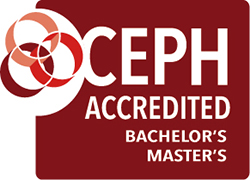
Public Health, MPH
Think and act beyond the classroom. Engage your whole self. Advocate for health equity and social justice. Prepare to be a public health leader in local and global communities.
Through rigorous coursework, fieldwork, and research, you develop a strong practice-based skill set to improve population health at local, state, national, and global levels. This is a two-year program completed over six semesters.
The USF Advantage

Cameron Grant BSN ’16, MPH ’20
Pediatric Nurse
Cura personalis guides me every day. It is the whole principle of my public health career.”
Cameron Grant BSN ’16, MPH ’20
Pediatric Nurse
Accreditation

The University of San Francisco Master of Public Health Program is fully accredited by the Council of Education for Public Health (CEPH) through December 31, 2026.
State Authorization
Please check our State Authorization Status List for the states and territories from which we can enroll students in specific online degree programs.
Take the Next Step
Admissions & Aid
Public Health, MPH
San Francisco, CA 94117
Monday–Friday
8:30 a.m. – 5 p.m.


